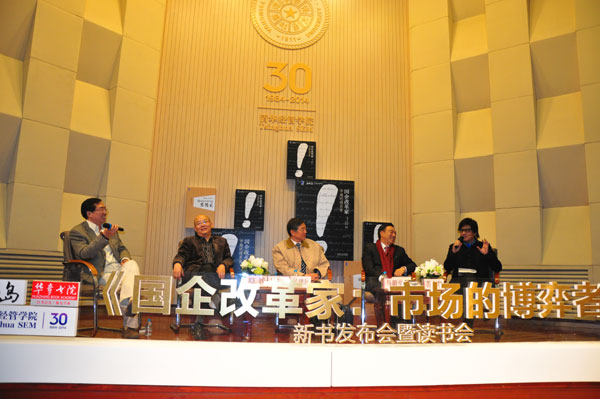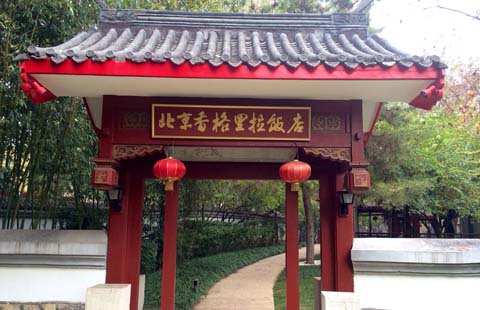New book on 5 top State-owned firms
Updated: 2014-11-28 15:05
By Liu Zhihua(chinadaily.com.cn)
|
||||||||
 |
|
[Photo by Liu Zhihua/chinadaily.com.cn] |
The past three decades has witnessed China’s rapid economic development, and State-owned enterprises have been growing since the start of the reform and opening-up.
Huazhang Book Academy, a Beijing-based book club, and Zhisland, a club and social platform for top entrepreneurs, are jointly offering a book to readers who want to know more about China’s internationally recognized State-owned enterprises and their top leaders.
The book, titled Reformers within State-owned Enterprises and published by China Machine Press earlier this month, is a collection of interviews and life stories of five top entrepreneurs in five influential State-owned enterprises.
"China’s fast development in the past decades relied on numerous entrepreneurs. I’ve always wanted to record their effort and achievements, especially those working in the State-owned system," says Liu Donghua, founder and CEO of Zhisland.
"Leaders of State-owned companies need to be sensitive enough both to the market and the politics, if they want to successfully lead reforms within the State-owned system, which requires great techniques, vision, will and strategy." The book has five chapters.
Each chapter tells the life stories and reform initiatives of the five entrepreneurs in a chronological order.
The five entrepreneurs are Qin Xiao, former chairman of China Merchants Group, Song Zhiping, president of China National Building Material Corp, Ning Gaoning, chairman of the China National Cereals, Oils and Foodstuffs Corp, Ma Weihua, former president of China Merchants Bank, and Gao Xiqing, former general manager of the China Investment Corp.
It also analyzes the dynamics behind the success of each entrepreneur, and in most cases, ends with a documentation of the exclusive interviews on topics related to the entrepreneur’s work, such as financial reform.
Su Xiaohe, an established business journalist who conducted most of the interviews with the entrepreneurs, is the book’s writer.
Both Liu and Su credit the book to direction from Wu Jianmin, the former Chinese ambassador to France. Wu, also executive vice-chairman of the China Institute for Innovation and Development Strategy, a think tank, initiated the project with Zhisland.

 6 things you should know about Black Friday
6 things you should know about Black Friday
 Calm comes to troubled Ferguson
Calm comes to troubled Ferguson
 Daredevil dancer conquers mountain
Daredevil dancer conquers mountain
 China's celebrity painters
China's celebrity painters
 Beauty of Beijing float making debut in Macy's parade
Beauty of Beijing float making debut in Macy's parade
 The plight of pregnant women in rural China
The plight of pregnant women in rural China
 Rescue dogs show skills in NW China
Rescue dogs show skills in NW China
 Top 10 largest hotel chains in China
Top 10 largest hotel chains in China
Most Viewed
Editor's Picks

|

|

|

|

|

|
Today's Top News
China, US targeting terror online
More understandings, co-op between China and US
Macy's says huanying to Chinese tourists
Cupertino gets attention with its Asian-American-majority City Council
Amazon takes Black Friday to China
BMO Global Asset Management Launches ETFs in Hong Kong
BlueFocus aims to acquire Canadian company
Microsoft to face $137m bill for back taxes
US Weekly

|

|








